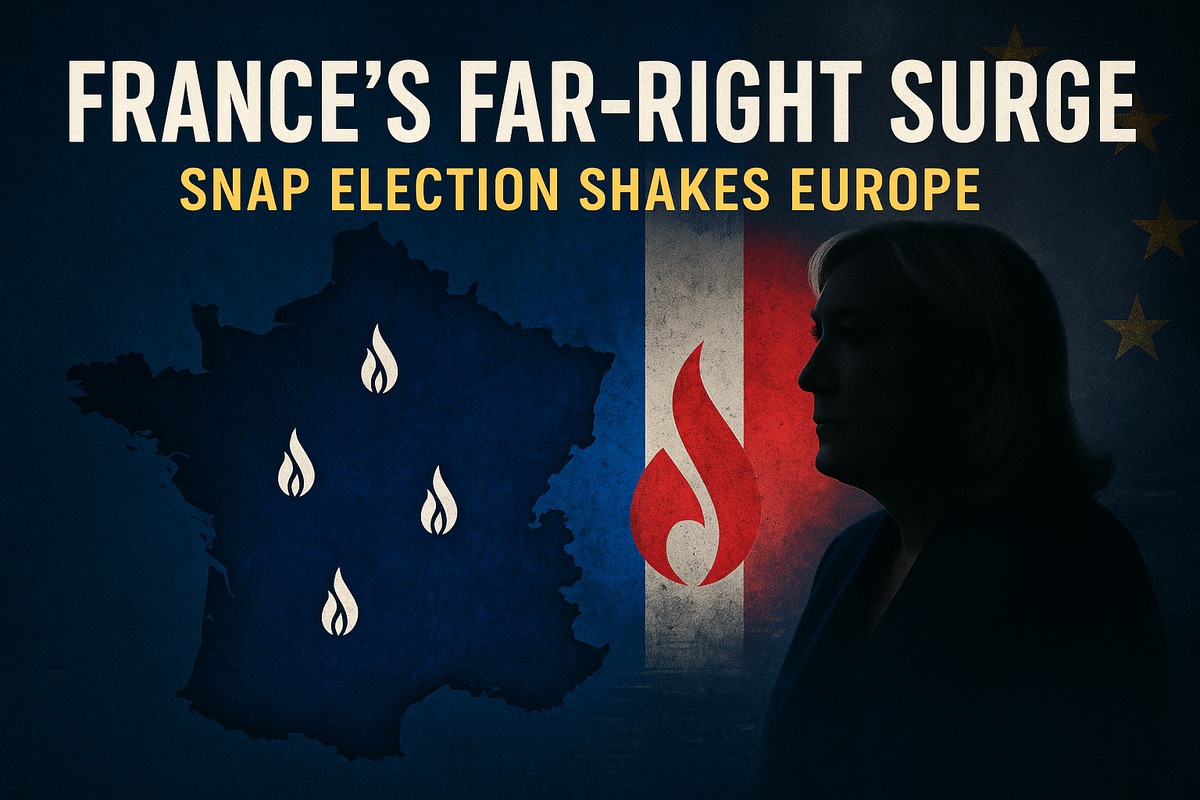France’s Far-Right Breakthrough: What the Snap Election Means for Europe
France’s far-right National Rally has surged in snap elections, reshaping the nation’s politics. The breakthrough signals rising nationalism, challenging European unity and reshaping debates over immigration, security, and EU integration.

Introduction: A Political Earthquake in the Heart of Europe
France has always taken pride in being the cradle of European liberal democracy a country whose revolutionary tradition consecrated liberté, égalité, fraternité. But the aftershocks from President Emmanuel Macron's call for snap legislative elections in June 2025 have shattered that image and shaken capitals from Berlin to Brussels.
The ballot, aimed by Macron to end the deadlock in parliament and normalize rule, instead turbo-charged far-right National Rally (Rassemblement National, RN), thrusting France into an unprecedented political meltdown.
As the votes were counted RN securing over 35% of the vote, burying the centrist bloc and shooting past the fractured left the question being asked all over Europe was stark:
Are we seeing the far-right nationalism of the center of the European Union being normalized?
This piece delves into how France arrived here, why the RN gains are important far beyond Paris, and what it might portend for the future of European politics.
The Road to Snap Elections: Macron's Risk
Background: The Macron Presidency on the Edge
Macron was elected in 2017 as the centrist antidote to populism, routing Marine Le Pen in a decisive runoff election. La République En Marche! rapidly accrued a parliamentary majority.
But by 2024, Macron's base had weakened under the pressure of:
- Increasing cost-of-living pressures (6% plus inflation)
- Growing discontent with immigration
- Recurring Yellow Vests protests and pension reform strikes
After the 2024 European Parliament elections where the RN swept French returns with more than 31% Macron was confronted with an embarrassment of political facts: his centrist coalition no longer held legitimacy.
In a desperate gamble, Macron dissolved the National Assembly on June 9, 2025, hoping that fresh elections would galvanize moderates. Instead, the bet spectacularly backfired.
Anatomy of the Far-Right Surge
Marine Le Pen's Strategy
As in the previous cycles, the RN in 2025 offered a platform that:
- Softened its aggressively Euroskeptic rhetoric
- Focused on "order and protection"
- Obsessed single-mindedly with immigration controls and buying power
Le Pen's heir apparent, Jordan Bardella, a photogenic 29-year-old MEP, was the public face of a reinvented movement: contemporary, young, committed to appearing mainstream.
This strategic move away from the party's poisonous history (Jean-Marie Le Pen's explicit racism and anti-Semitism) paid off in the polls.
Voter Disillusionment
Exit polls and post-election studies show:
- Economic concern dominated the motivations of voters (mentioned by 43% of RN voters)
- Immigration and security were the second most powerful driver (mentioned by 31%)
- Fewer than 14% mentioned "defense of French identity" as the main motive highlighting the RN's success in presenting their agenda as pragmatic instead of ideological
The RN also took votes from:
- Disaffected left-wing blue-collar workers in post-industrial areas
- Conservative pensioners in the south of France
- Younger voters disillusioned with the centrist establishment
The Numbers That Shook Europe
The overall outcome was dramatic:
- National Rally (RN): ~35% of votes (predicted 190–220 seats)
- New Popular Front (Left coalition): ~28%
- Macron's centrist Ensemble bloc: ~20%
- Les Républicains (traditional conservatives): ~9%
For the first time in history since the Fifth Republic's creation in 1958, a far-right party occupies a leading position in the French parliament.
Immediate Implications in France
A Divided National Assembly
France is now confronted with:
- A hung parliament with no majority
- Difficult coalition negotiations, as mainstream parties are unwilling to join RN
- The potential for cohabitation, where Macron is president but a far-right prime minister controls domestic policy
This cohabitation would be filled with ideological tension:
- Macron keeps foreign and defense policy in his hand
- The RN would control domestic policy, immigration, and budgetary priorities
Social Tensions Mounting
In French cities, tens of thousands have marched against the outcome:
- Protests in Paris, Lyon, Marseille against the "fascist menace"
- Violence between RN supporters and anti-fascist groups
- Labor unions vowing mass strikes to oppose RN policies
Security services have raised the threat level, citing risks of politically motivated violence.
Implications for the European Union
The rise of the RN in France does not occur in isolation. Across Europe, the far-right is ascendant:
- Italy: Giorgia Meloni’s Brothers of Italy continues to consolidate power
- Germany: Alternative for Germany (AfD) is polling at record highs
- Netherlands: Geert Wilders' PVV was the most powerful force in recent elections
- Spain: Vox maintains significant parliamentary presence
Partial far-right rule over France, the second-largest economy in the EU, makes nationalist narratives business as usual in Brussels.
Principal risks:
- Immigration Policy
- RN will push Macron to reinstating internal border controls and hardening asylum procedures against Schengen norms.
- Budget and Fiscal Rules
- The RN has indicated distrust of EU fiscal restraint, particularly restrictions by the Stability and Growth Pact.
- Ukraine and NATO
- While Le Pen softened her position, RN legislators continue to oppose sending military supplies to Ukraine.
- Macron's pro-Ukrainian stance might be offset by RN hesitation.
- EU Institutional Stability
- Paris moving closer to Budapest and Rome's nationalist camps might undermine unity on sanctions, defense, and enlargement.
The Economic Fallout
Markets React
Election night:
- The euro dropped 1.4% versus the dollar
- French government bond yields rose, indicating investor concern over budget stability
- Credit rating agencies sent out signals of possible downgrades if fiscal responsibility is eroded
Business Confidence Stumbles
French business unions (MEDEF) cried out that:
- RN's economic policies may invite EU legal action
- Introducing frontier controls would hit supply chains
- Growing social tensions might discourage investment
International Response
European leaders reacted guardedly but anxiously:
- Germany's Olaf Scholz: "The French people have spoken. We will work with any democratic government. But the EU project requires commitment to shared values."
- Italy's Giorgia Meloni: "The voice of the French nation is clear. Europe must respect democratic choices."
- Poland's Donald Tusk: "This is a wake-up call against complacency."
The White House indicated continued close collaboration while emphasizing the need to "protect democratic institutions and transatlantic security commitments."
What Happens Next? Scenarios to Watch
1. RN Forms a Minority Government
The RN might try to rule alone, legislating case by case. This threatens paralysis, since Macron can continue to veto and the Senate is still in centrist hands.
2. Cohabitation Compromise
In case Les Républicains or centrists split, a coalition would emerge under an RN prime minister. A "cohabitation" would most probably mean:
- Stricter immigration laws
- Economic populism (pension raises, price controls)
- Foreign policy compromise between Macron and RN
3. New Elections in 2026
If there is no stable majority, France may have to endure another election in a year a prospect that investors and European partners fear.
Why France's Agitation is an Alarm Bell in Europe
EU politics for decades was founded on the premise that the far-right could be kept on the margins. France's surprise election blew that myth apart:
- Becoming mainstream: RN's performance demonstrates that remaking, discipline, and social media acumen can bring once-toxic movements into the mainstream.
- Discrediting centrism: Macron's loss demonstrates the limits of technocratic centrism in managing cost-of-living crises.
- Cross-border contagion: Victory in France energizes mimetic movements in Germany, Belgium, and Spain.
The question for European democracies is no longer whether the far-right can seize power but what to expect when they do.
Conclusion: A Turning Point for France and Europe
The 2025 French snap election will be remembered as a watershed moment when:
- A far-right party gained unprecedented legitimacy
- Centrist consensus broke apart
- Europe's center of gravity moved towards nationalism
Whether this signals a lasting realignment or a fleeting protest vote will depend on what happens next:
- Can Macron achieve a lasting compromise at the negotiating table without lending legitimacy to RN policies?
- Will social pushback contain or embolden nationalist forces further?
- Can the EU balance growing nationalist aspirations with the aspiration for an integrated Europe?
Temporarily, France is torn between two visions of itself:
- A republic that boasts universalist ideals, European allegiances, and cosmopolitan values.
- A country yearning for security, sovereignty, and revolution.
- As the French themselves put it: "Rien n'est jamais acquis." Nothing is ever won for good.
Sources
CourtListener
- French Constitutional Council Rulings on Election Validity
Justia
- European Convention on Human Rights Jurisprudence Related to Political Parties
Archive.org
- 2017–2024 National Rally Manifestos
- Macron’s 2017 Presidential Platform
Google Trends
- Search trends for “Rassemblement National,” “snap election France,” and “Jordan Bardella”
Official Press Releases
- Élysée Palace Statements (June–July 2025)
- RN Party Communications (July 2025)
Reputable News Outlets
- Le Monde
- Politico Europe
- Financial Times
- The Economist
- France24
- Reuters
For more legal exposes and truth-behind-glamour stories, subscribe to AllegedlyNewsNetwork.com




